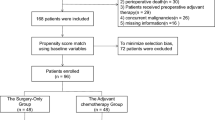Abstract
Background
Adjuvant chemotherapy (AC) is recommended as a standard treatment after curative resection in patients with pancreatic adenocarcinoma (PA). Although patients who failed to complete AC had significantly worse survival compared with those who completed AC for cancers in various organs, the effects of complete AC on survival in patients with PA have not been investigated. The purpose of this study was to clarify the impact of complete AC on PA patient survival and to identify independent risk factors for incomplete AC.
Methods
Medical records of 236 consecutive PA patients who planned to undergo surgical resection with curative intent between January 2000 and September 2012 at Kobe University Hospital were retrospectively reviewed. Of these, the complete AC (n = 75) and the incomplete AC (n = 30) groups due to adverse events were compared.
Results
Patient survival was significantly better in the complete AC group than in the incomplete AC group (median survival time 48.9 vs. 17.9 months; 5-year survival rate 42.7 vs. 17.1 %; p < 0.0001). Preoperative white blood cell count and postoperative serum albumin level were identified as independent risk factors for incomplete AC. By receiver operating characteristic curve analysis, the cutoff value of postoperative serum albumin level was 3.1 mg/dL.
Conclusions
PA patients who completed AC had significantly better survival than those who failed to complete AC. Postoperative serum albumin level is a marker for failure to complete AC. Further prospective studies are needed to determine whether perioperative nutritional intervention could increase AC completion rate and improve prognosis in PA patients.


Similar content being viewed by others
References
Neoptolemos JP, Stocken DD, Bassi C, et al. Adjuvant chemotherapy with fluorouracil plus folinic acid vs gemcitabine following pancreatic cancer resection: a randomized controlled trial. JAMA. 2010;304(10):1073–81.
Oettle H, Neuhaus P, Hochhaus A, et al. Adjuvant chemotherapy with gemcitabine and long-term outcomes among patients with resected pancreatic cancer: the CONKO-001 randomized trial. JAMA. 2013;310(14):1473–81.
Neoptolemos JP, Stocken DD, Friess H, et al. A randomized trial of chemoradiotherapy and chemotherapy after resection of pancreatic cancer. N Engl J Med. 2004;350(12):1200–10.
Oettle H, Post S, Neuhaus P, et al. Adjuvant chemotherapy with gemcitabine vs observation in patients undergoing curative-intent resection of pancreatic cancer: a randomized controlled trial. JAMA. 2007;297(3):267–77.
Ueno H, Kosuge T, Matsuyama Y, et al. A randomised phase III trial comparing gemcitabine with surgery-only in patients with resected pancreatic cancer: Japanese Study Group of Adjuvant Therapy for Pancreatic Cancer. Br J Cancer. 2009;101(6):908–15.
Morris M, Platell C, Fritschi L, Iacopetta B. Failure to complete adjuvant chemotherapy is associated with adverse survival in stage III colon cancer patients. Br J Cancer. 2007;96(5):701–7.
Aoyama T, Yoshikawa T, Shirai J, et al. Body weight loss after surgery is an independent risk factor for continuation of S-1 adjuvant chemotherapy for gastric cancer. Ann Surg Oncol. 2013;20(6):2000–6.
Fairfield KM, Murray K, Lucas FL, et al. Completion of adjuvant chemotherapy and use of health services for older women with epithelial ovarian cancer. J Clin Oncol. 2011;29(29):3921–6.
Lohrisch C, Paltiel C, Gelmon K, Speers C, Taylor S, Barnett J, et al. Impact on survival of time from definitive surgery to initiation of adjuvant chemotherapy for early-stage breast cancer. J Clin Oncol. 2006;24(30):4888–94.
Sobin LH, Gospodarowicz MK, Wittekind C (eds). International Union Against Cancer (UICC). TNM classification of malignant tumors. 7th ed. New York: Wiley-Blackwell; 2010.
Dindo D, Demartines N, Clavien PA. Classification of surgical complications: a new proposal with evaluation in a cohort of 6336 patients and results of a survey. Ann Surg. 2004;240:205–13.
Wente MN, Bassi C, Dervenis C, et al. Delayed gastric emptying (DGE) after pancreatic surgery: a suggested definition by the International Study Group of Pancreatic Surgery (ISGPS). Surgery. 2007;142(5):761–8.
Bassi C, Dervenis C, Butturini G, et al. Postoperative pancreatic fistula: an international study group (ISGPF) definition. Surgery. 2005;138:8–13.
Nurgalieva ZZ, Franzini L, Morgan RO, Vernon SW, Liu CC, Du XL. Impact of timing of adjuvant chemotherapy initiation and completion after surgery on racial disparities in survival among women with breast cancer. Med Oncol. 2013;30(1):419.
Don BR, Kaysen G. Serum albumin: relationship to inflammation and nutrition. Semin Dial. 2004;17(6):432–7.
Rothschild MA, Oratz M, Schreiber SS. Serum albumin. Hepatology. 1988;8(2):385–401.
Makary MA, Segev DL, Pronovost PJ, et al. Frailty as a predictor of surgical outcomes in older patients. J Am Coll Surg. 2010;210(6):901–8.
Englesbe MJ, Patel SP, He K, et al. Sarcopenia and mortality after liver transplantation. J Am Coll Surg. 2010;211(2):271–8.
Dobrila-Dintinjana R, Trivanovic D, Zelic M, et al. Nutritional support in patients with colorectal cancer during chemotherapy: does it work? Hepatogastroenterology. 2012;60(123):475–80.
La Torre M, Nigri G, Cavallini M, Mercantini P, Ziparo V, Ramacciato G. The Glasgow Prognostic Score as a predictor of survival in patients with potentially resectable pancreatic adenocarcinoma. Ann Surg Oncol. 2012;19(9):2917–23.
Jamieson NB, Denley SM, Logue J, et al. A prospective comparison of the prognostic value of tumor- and patient-related factors in patients undergoing potentially curative surgery for pancreatic ductal adenocarcinoma. Ann Surg Oncol. 2011;18(8):2318–28.
Park JS, Chung HK, Hwang HK, Kim JK, Yoon DS. Postoperative nutritional effects of early enteral feeding compared with total parental nutrition in pancreaticoduodectomy patients: a prosepective, randomized study. J Korean Med Sci. 2012;27(3):261–7.
Lassen K, Coolsen MM, Slim K, et al. Guidelines for perioperative care for pancreaticoduodenectomy: Enhanced Recovery After Surgery (ERAS) Society recommendations. Clin Nutr. 2012;31(6):817–30.
Baradi H, Walsh RM, Henderson JM, Vogt D, Popovich M. Postoperative jejunal feeding and outcome of pancreaticoduodenectomy. J Gastrointest Surg. 2004;8(4):428–33.
Yang H, Feng Y, Sun X, Teitelbaum DH. Enteral versus parenteral nutrition: effect on intestinal barrier function. Ann N Y Acad Sci. 2009;1165:338–46.
Disclosure
The authors have no conflicts of interest to disclose.
Funding
No grant support was provided for this study.
Author information
Authors and Affiliations
Corresponding author
Rights and permissions
About this article
Cite this article
Matsumoto, I., Tanaka, M., Shirakawa, S. et al. Postoperative Serum Albumin Level is a Marker of Incomplete Adjuvant Chemotherapy in Patients with Pancreatic Ductal Adenocarcinoma. Ann Surg Oncol 22, 2408–2415 (2015). https://doi.org/10.1245/s10434-014-4280-7
Received:
Published:
Issue Date:
DOI: https://doi.org/10.1245/s10434-014-4280-7




